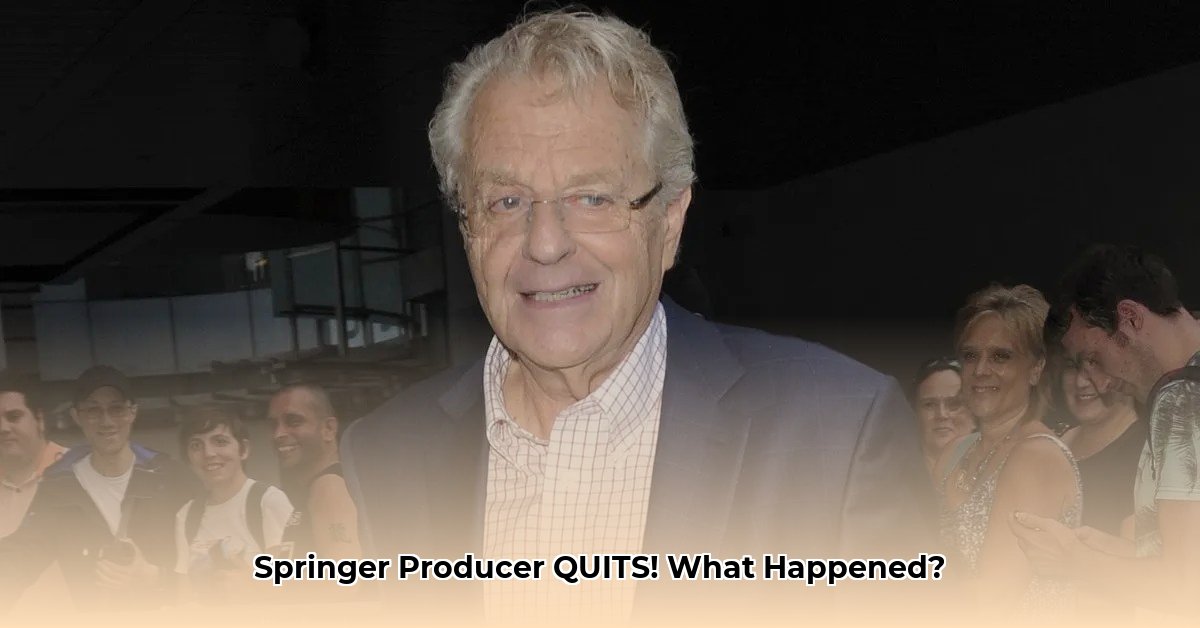The Breaking Point: Incest, Exploitation, and a Producer’s Exit
The Jerry Springer Show, a spectacle of dysfunctional families and outrageous confrontations, was no stranger to controversy. But behind the on-screen chaos, a far more disturbing story unfolded, one that led long-time producer Toby Yoshimura to abruptly resign. His departure wasn’t spurred by the typical Springer-esque drama; it was a consequence of witnessing an incident so ethically troubling that it shattered his tolerance for the show’s exploitative practices.
A Daughter’s Plea and a Father’s Betrayal
Yoshimura, a seasoned producer accustomed to the show’s theatrical nature, received a call from a young woman claiming her father coerced her into prostitution at the age of sixteen. Seeing the potential for a dramatic confrontation, Yoshimura booked them both on the show. However, in the hours leading up to filming, a routine check-in at the daughter’s hotel room revealed a horrifying scene. Yoshimura discovered the father, partially clothed, in the daughter’s room, with the young woman visibly distraught. The unspoken implication hung heavy in the air: they had just engaged in sexual intercourse. This incident, documented in the Netflix documentary Jerry Springer: Fights, Camera, Action, became Yoshimura’s breaking point. He recounted the experience in the documentary, describing the gut-wrenching realization of the show’s exploitative nature.
The Silent Resignation and a Moral Reckoning
Yoshimura’s departure wasn’t marked by a dramatic exit or a scathing resignation letter. Instead, he quietly packed his belongings and walked away, severing all ties with the show. This silent resignation speaks volumes, suggesting a deep moral conflict and a profound disillusionment with the world he had inhabited for so long. “It hit me like a sledgehammer,” Yoshimura stated in the documentary, revealing the emotional weight of the incident. The experience forced him to confront the ethical implications of the show’s content and the potential harm inflicted on vulnerable individuals. He suspected that the producers may have orchestrated the encounter between the father and daughter, adding another layer of moral complexity to the situation.
The Ethical Fallout and the Price of Entertainment
Yoshimura’s story raises crucial questions about the nature of reality television and its potential for exploitation. Did the show prioritize ratings over the well-being of its participants? Where does entertainment end and exploitation begin? Was Yoshimura’s departure an isolated incident, or did it reflect a broader pattern of questionable ethical practices within the show’s production? Some experts suggest that the pressure to create dramatic content can lead to situations where vulnerable individuals are manipulated for the sake of ratings. Yoshimura’s experience lends credence to this theory, highlighting the potential for exploitation and the psychological toll it can take on those involved, both in front of and behind the camera.
Beyond the Headlines: The Human Cost of Tabloid TV
Yoshimura’s story is not just about one man’s departure from a controversial TV show; it’s a stark reminder of the human cost of tabloid television. His struggles with substance abuse after leaving the show underscore the potential psychological impact of working in such a high-pressure, morally complex environment. The constant exposure to raw human emotions, the blurring of lines between reality and staged drama, and the ethical dilemmas inherent in the genre can leave lasting scars. While the long-term effects on the mental and emotional well-being of those involved in producing such shows are still being researched, Yoshimura’s experience offers a compelling case study, prompting further investigation into the potential negative impacts.
The Springer Legacy: A Complicated Narrative
Jerry Springer himself, in a resurfaced clip, admitted to “ruining the culture,” a statement that resonates with Yoshimura’s concerns and adds another layer of complexity to the show’s legacy. Whether intended as sarcasm or a moment of genuine reflection, Springer’s comment suggests an awareness of the show’s potential negative impact. The ongoing debate about the show’s ethical practices, the extent of manipulation, and its lasting influence on popular culture continues to this day. Yoshimura’s story is a vital contribution to this conversation, urging viewers to look beyond the sensationalism and consider the human consequences of reality television’s relentless pursuit of entertainment.







